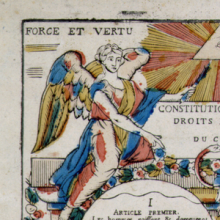Social Structure

Liberty
Even before the French Revolution, the French had used a woman in a toga to symbolize liberty. By July 1789 this symbol had become quite common and would only grow more familiar over the revolutionary decade.

Source Collection: The Enlightenment and Human Rights
When the French revolutionaries drew up the Declaration of the Rights of Man and Citizen in August 1789, they aimed to topple the institutions surrounding hereditary monarchy and establish new ones based on the principles of the Enlightenment, a philosophical movement gathering steam in the eight

Source Collection: Monarchy Embattled
Reality never matched the popular image of the all-powerful French King. Even Louis XIV, exalted by his own propagandists and many historians as the Sun King, never actually enjoyed that kind of authority. Theories of divine right, which linked the King to God, proved untenable for many.

Louis XVI distributes aid to the Poor
Here Louis XVI is portrayed as a benevolent king distributing alms to the poor, an appropriate action for the "Father of his people." However, his rich fur–clad outfit contrasts with the abject poverty of the common people, suggesting to those inclined to be critical that the King did not underst
Moreau, "On the Origins of the French Monarchy"
Jacob–Nicolas Moreau wrote this excerpt as part of his Lessons of Morality, Politics and Law (1773) at the request of the aging Louis XV for the instruction of the Dauphin. Throughout the 200–page book, Moreau defends the power of the King to rule France without opposition.
Bossuet, "The Nature and Properties of Royal Authority"
Jacques–Benigne Bossuet (1627—1704), bishop of Meaux, was a well–known seventeenth–century peacher who believed that although France had a sizable minority of Protestants, France should have a single religion, Catholicism.
Proclamation of the Department of the Seine–et–Oise (9 March 1792)
Despite the radical measures taken by the National Assembly, such as the abolition of nobility and the Civil Constitution of the Clergy, social conflicts continued to manifest themselves after the National Assembly completed its work in 1791.
Letter from Rabaut de Saint–Étienne to the Minister of the Interior (27 February 1791)
In this document, Jean–Paul Rabaut de Saint–Étienne, a Protestant pastor from Nîmes who had been a deputy to the National Assembly and who would later be elected to the National Convention, warns the central government of the ongoing violence in the Midi and the role of refractory priests and rel
Letter from a Birmingham Jail
Martin Luther King Jr. wrote his "Letter from a Birmingham Jail" on April 16, 1963 as a response to a letter titled "A Call for Unity" which was written 4 days prior. "A Call for Unity" was signed by eight white clergymen who led churches in Birmingham, Alabama.
Moralia
Part of Plutarch's Moralia, these sayings by Spartan women demonstrate not only the martial culture of Sparta that emphasized physical courage and honor, but also the role of women in reinforcing that culture.